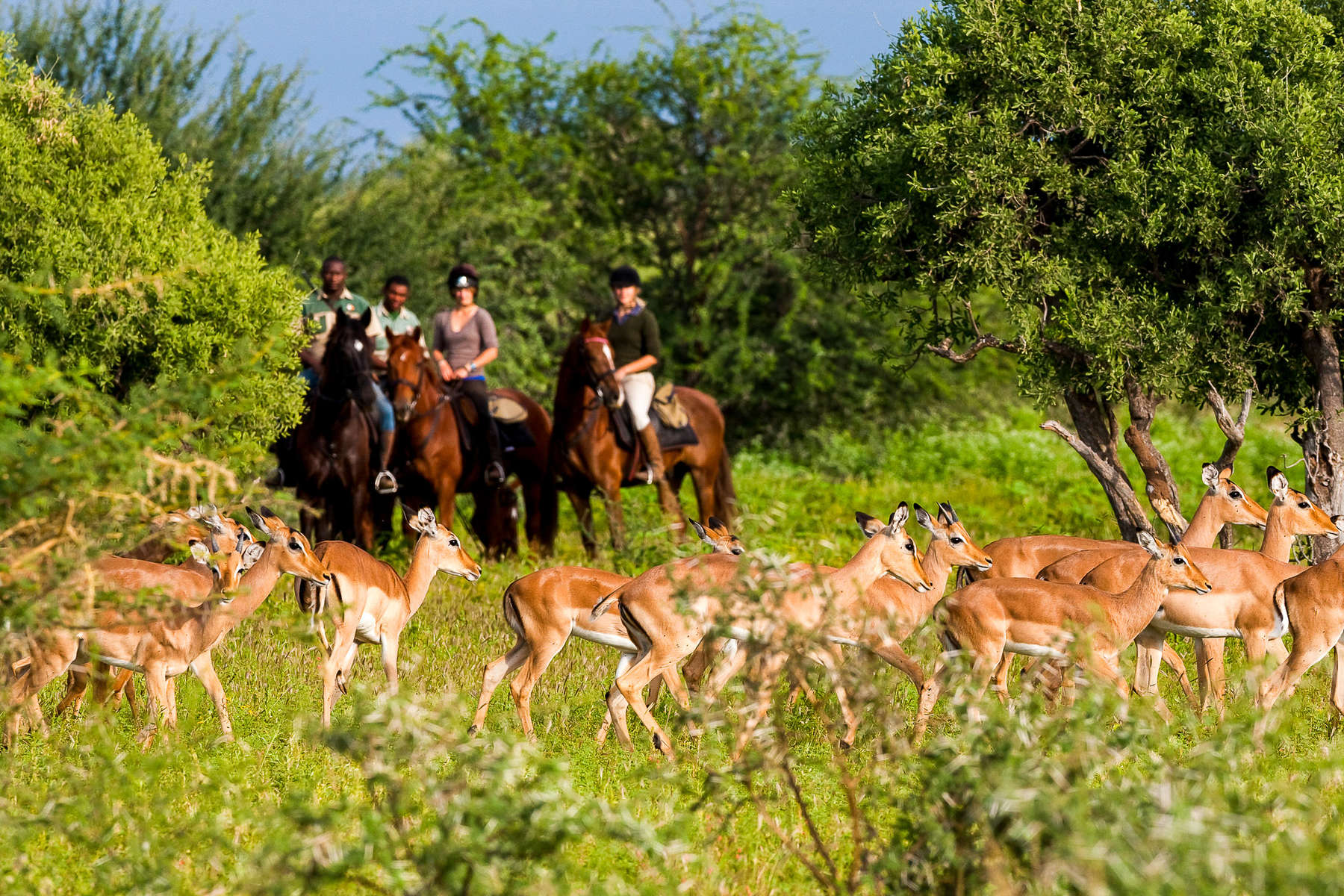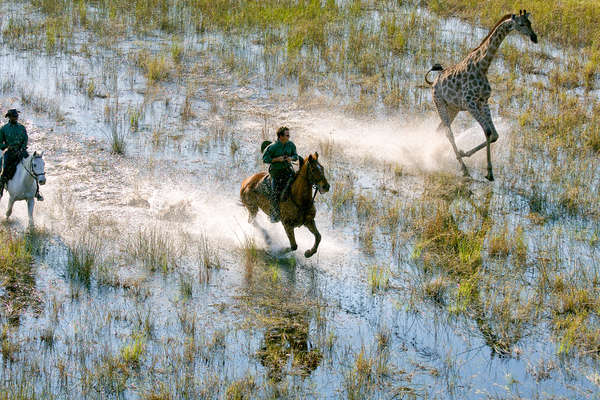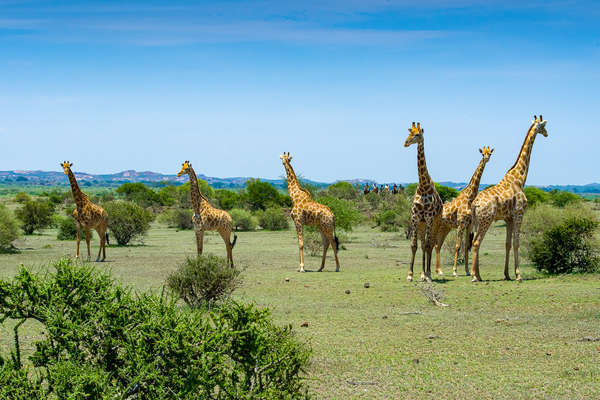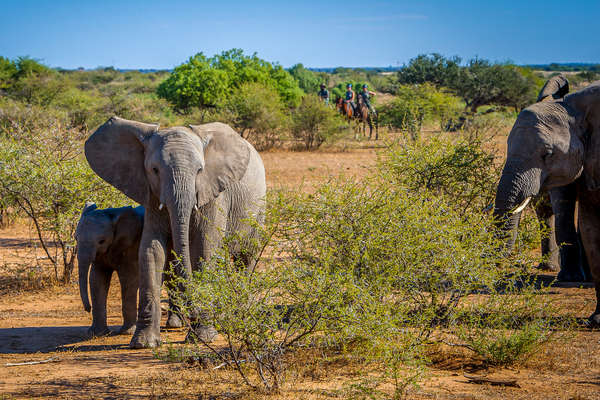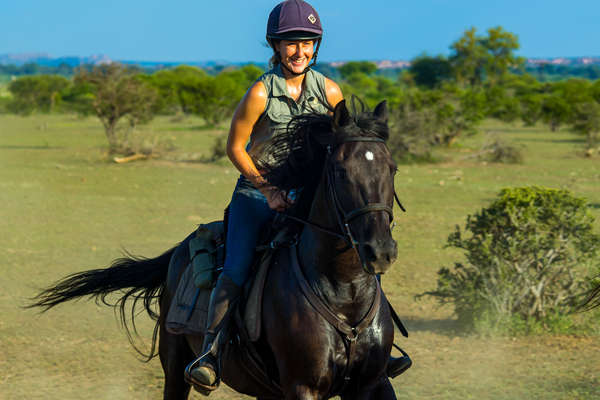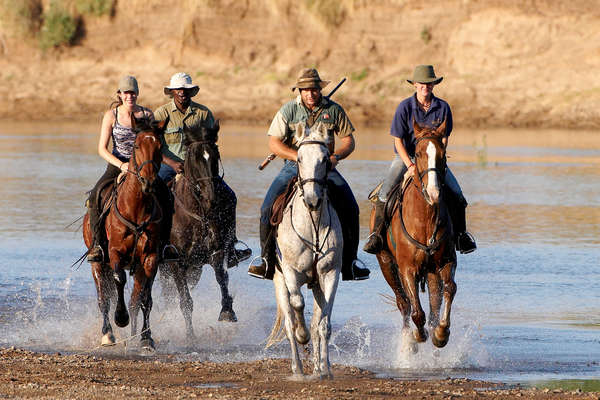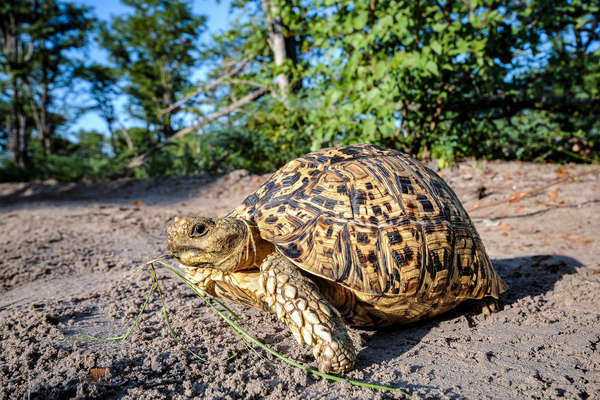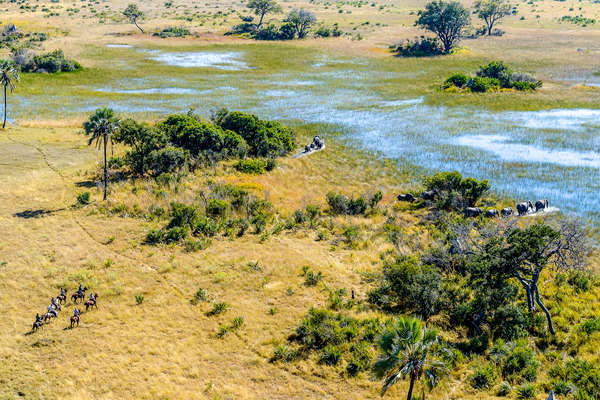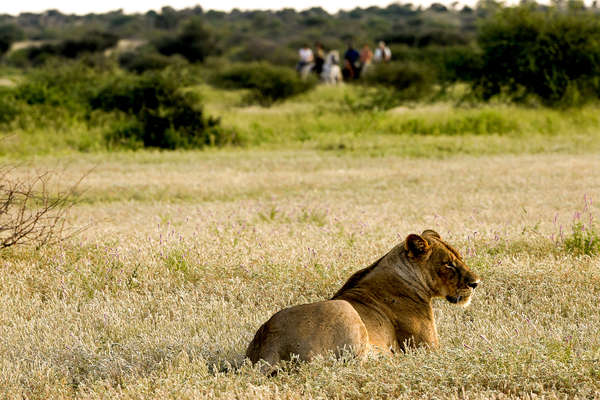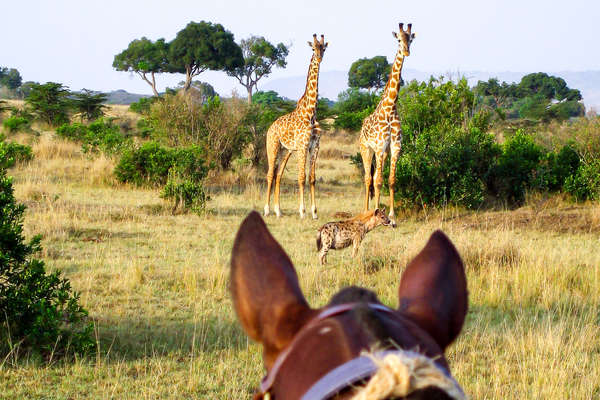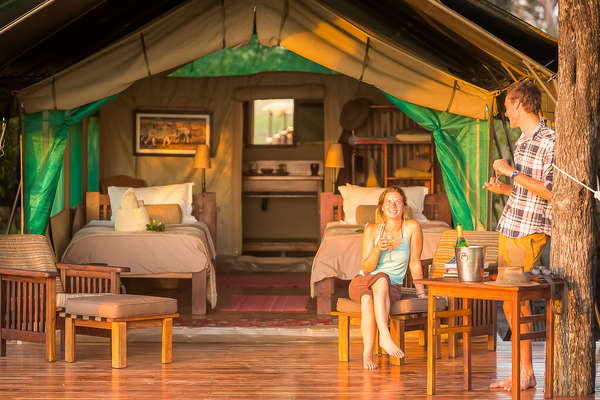Comfort
Tuli block:
- First night in Two Mashatus camp: this camp is situated close to the Limpopo river. Four large walk-in tents pitched on teak platforms with ensuite loo and hot shower. Each tent is private and positioned in the shade of a tree with a small deck area on which to relax during the afternoons. Traditionally built Lala palm rondavels serve as dining area and lounge.
- Two nights in Kgotla camp: the Kgotla is an old tribal court from a nearby community that was relocated to the banks of the Motloutse River on the western periphery of Mashatu. The boma is an open-air traditional African enclosure made up of leadwood logs. Guests sleep on beds around a large log fire which blazes at the centre.
- Two nights in wilderness mobile camps: each campsite is set up in a specific location within the Mashatu Reserve. Accommodation is in A-frame tents on comfortable beds with sheets and cozy duvets. Facilities include a bucket shower and bush-WC. Meals are cooked for you over a camp fire.
All camps feature comfortable beds with proper bedding and cotton sheets.
NB. At certain times of year it is not possible for the ride to be mobile and you will spend all five nights at Two Mashatus camp.
Okavango delta:
Macatoo camp features large, walk-in, twin bedded tents, each with their own en-suite shower and loo. The tents are built on wooden platforms and face out onto the lagoon, with a deck providing seating. Centrally there is a large furnished mess tent, dining area and a plunge pool. If the weather is kind then you may be able to spend a night on their purpose built Treehouse Platform on a nearby island.
Please note that phone coverage is limited in the Tuli Block, and inexistant at Macatoo. For safety reason, the team and guides are equiped with a satelite phone. WiFi is not available.
Meals
Breakfast is usually taken very early (before dawn) and is therefore light, consisting of cereals, fruit and bread with tea or coffee.
Lunch is also light and may be quiche and salad or a variety of salads with cold meats.
Dinner is three courses. Wine is served with the meals and a selection of drinks are available.
Vegetarians and special diets can be catered for with advance notice.
Climate
The seasons are the reverse of the UK, with winter (June - Sept) being dry with no rain and clear skies. Daytime temperatures are pleasant and the nights are cool. Summer (Nov - March) is hot and there is the chance of dramatic thunderstorms.
OKAVANGO DELTA: WHEN TO GO?
The Okavango Delta is a seasonal flood plain and so different times of the year offer different experiences - each magical in its own way. The water level in the Delta depend on the rainfall in Angola and the floods usually arrive around April/May and recede around September/October, but this varies every year and is difficult to predict. The following guide may prove useful when planning the best time for your holiday.
March/April : Daytime temperatures are warm/hot (25-35c) and will drop to 10-20c at night. There is a small chance of rain and the bush is green and lush. There will be waterholes left over from the rainy season but the flood may not have arrived yet. Because of the rain, lush grazing and plentiful waterholes the game is dispersed and not gathered in big herd but will look fat and healthy.
May : Daytime temperatures are falling (20-30c) and it is starting to feel cooler at night (5-10c). The floods normally arrive in May which brings high levels of bird life. The large herds of lechwe antelope and buffalo will start to move into the area, but game is still dispersed as there is plenty to eat and drink.
June-August : Daytime temperatures are still pleasant (20-25c) but night are cold (3-5c) and so the early morning and late evenings are chilly. The floods are at their highest and so there is plenty of wading from island to island and boat activities. Hippo and crocodile may move into the area as well as large buffalo and antelope herds.
September/October : Spring arrives and temperatures start to climb with daytime temperatures of 30-45c, dropping to 15-25c at night. The floods are starting to recede, the islands are dry as there has not been rain for months and so the game starts to concentrate around the water holes.
November - February : The rain can arrive anytime in November. Daytime temperatures are high before the rains (30-40c) but drop after each shower. It is unlikely to rain persistently, but usually for a few hours. Nights are still warm (15-20c). The bush turns green after the rains and the grass starts to grow again. Once the waterholes start to fill again the game will disperse. The antelope will give birth during this time of plenty.
Tips
We recommend tipping USD 10-15 per day which can be split between all the staff. You should tip your guide seperately and riders usually tip USD 10 per day per guide.
Packing list
Specific Recommendations
- Please don't take a hard sided suitcase. Your luggage should be soft sided, particularly for the light air transfers. There is a strict 20kg limit including your hand luggage - your checked bag must be under 15 kg.
- Wherever possible you should wear neutral colours, such as beige, brown or natural bush colours for riding as bright colours, such as red, yellow or white can startle the wildlife and they will see you long before you've seen them
- We recommend travelling in your riding boots and carrying your hat and some riding clothes in your hand luggage - then if your luggage goes astray you are still able to ride!
Head
- You will be required to wear a hard hat when riding in the Tuli block and you should take your own to ensure a correct fit. We recommend wearing your hard hat at Macatoo as well.
- Sunhat for when not riding
- Sunglasses - with a cord attached so they don't fly off when riding
- Buff or bandana
Upper body
- Long sleeved shirts provide protection from the sun and thorns
- T-shirts
- Fleece, jumper or jacket - the evenings can be cold, particularly June - August
- Waterproof jacket - the rains can be difficult to foresee and it's better to be prepared. Rain is more likely Oct-April and you may also appreciate a waterproof jacket during June-Sept in the Delta for splashy canters
- Casual clothes for the evening
Legs
- Lightweight, comfortable riding trousers or jodhpurs - we recommend riding in them at home before taking them on holiday to ensure they don't rub
- Shorts for lazy lunchtimes
- Casual clothes for the evening
Hands and Feet
- Comfortable riding boots. We recommend short boots with half chaps but you may wish to take long chaps to protect against thorns. Ideally you should bring two pairs of shoes and chaps, and we recommend light, non-waterproof fabric that will dry quickly. We don't recommend taking your favourite long leather boots in case they get damaged.
- Sandals, flip-flops or trainers for moving around the lodge and camp
- Gloves - your hands are particularly exposed to the sun whilst riding
Other useful items
- Swimsuit - for plunge pools
- Binoculars for viewing game
- Camera and high capacity memory card. Spare battery
- Bumbag for carrying your camera and small items whilst riding
- Headtorch or torch for moving around camp at night - some mobiles have a torch option but this is not sufficient.
- Waterproof pouches if you want to bring your camera or phone with you whilst riding in the Okavango Delta
In your luggage
- Any liquids, such as shampoo, moisturiser, deodorant unless they are less than 100ml and all bottles can fit in a small, clear, plastic ziplock bag. Some toiletries are provided by the camps so you can pack lighter.
Medical kit
- Sunscreen and lip balm - must be high factor
- Insect repellent, preferably containing deet
- Any medication you regularly take
- Blister plasters in case of any rubs
- Antiseptic cream, plasters, aspirin, anti-histamine, insect-bite salve etc...
- Spare prescription glasses/contact lenses
- Anti malarial tablets and Yellow Fever Certificate if required (check with your doctor)

